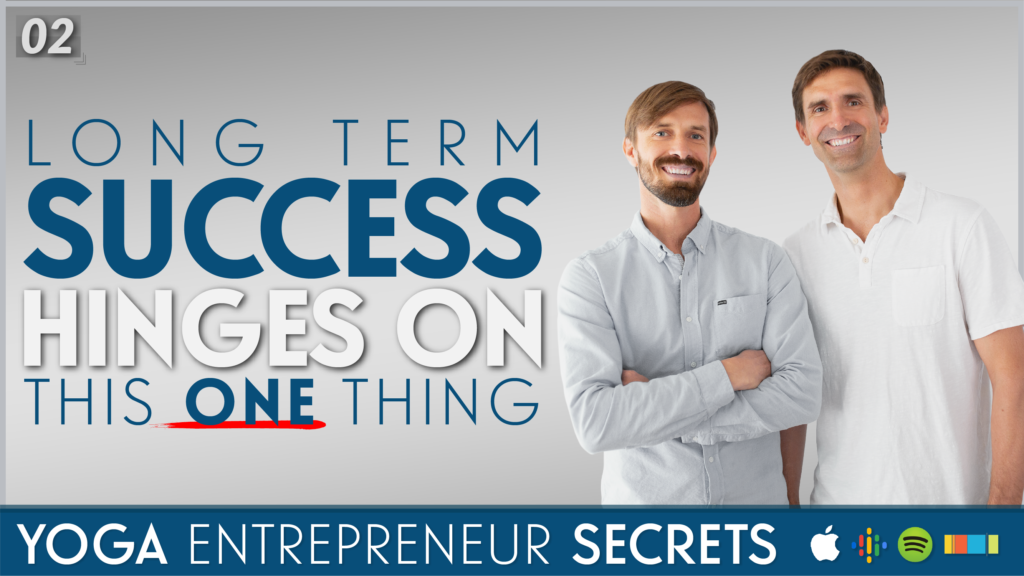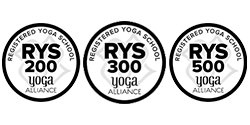02: Long-term Success Hinges On This One Thing – Yoga Entrepreneur Secrets

What Is This Episode About…
In this episode, we are going to talk about the one thing in the past 15 years of doing work in the yoga industry, that we attribute to our success. When we started our yoga studio in 2005, our classes were hot, but we didn’t have a system. We were both consistent in the sequences we were teaching, but one of our teachers was always doing things differently, which became a huge problem later on.
Over time, we realized that we needed to develop a framework that we would be consistent with, to ensure sustainable success for the studio, and that led us to greater heights than we ever thought possible. Listen in to learn all the tips we have to share on that.
Key Points Discussed:
- Staying in business through the ups and downs of the economy (00:49)
- Sticking to a framework leads to specific results (03:18)
- A teacher-based studio versus a class-based studio (05:44)
- Inconsistency breeds distrust (09:23)
- Holding the vessel of the class that people come into experience (11:09)
Learn More About The Content Discussed…
Join The Facebook Group –> http://bit.ly/yogaentrepreneur
When Was It Released…
This episode was released July 24, 2019
Episode Transcript…
Disclaimer: The Transcript Is Auto-Generated And May Contain Spelling And Grammar Errors
00:00 Hey everybody. So today we are going to talk about the one thing in the past 15 years of doing work in the yoga industry and if we could pin down one thing that we attribute to our success, this will be it.
00:07 What’s up everyone, you are listening to Yoga Entrepreneur Secrets. I am Chris Yax and I’m John Yax we are part of a small group of yoga entrepreneurs who are committed to making a living doing what we love, without feeling guilty about making money or ashamed of being successful because we know the real value of yoga and how the world needs it. Now more than that, this podcast is here to teach the strategies and tactics so we can try financially as yoga entrepreneurs. We are the Yax brothers and welcome to Yoga Entrepreneur Secrets. All right, thank you for tuning in today.
00:49 So this is an exciting one for us because what we’re really we want to talk about is like if we had to boil it all down like what would be the thing, the very thing that we would pin to the success and the consistency that we’ve had over the years. In, like going through the great recession and staying in business and all the ups and downs of the economy that have been from the great recession until now, you know, changes in administration and all that stuff. This is not a political podcast, but so what would that one thing be? Well, I think it like the best way to start is with the story. Yeah. So when years ago when there was a restaurant that we always went to as a Mexican restaurant, and when we first started going to it, it was really great. Portions were big, the food was delicious. And, and so we always went to it like, so every, you know, every, I don’t know, cause like every Sunday it was, we were consistent with it, but we always, we’d have our routine.
01:38 And so during that day, every week we’d go to it and, and we did that for a year, maybe two years or how long we did it. But then something changed. It was only, it either the chefs changed or ownership changed. But what we noticed is when we went back, the food was different. Same dish, right. We ordered the same exact thing we ordered every time, but it was different. It tasted different. There was something different and it wasn’t just different and like it stayed that different flavor every time. Like there was a point at which when we went back, whether it was the management or whether it was a chef or they change something there at the restaurant, every time we went it was different. Ordering the same thing cause you know we’re creatures of habit, but all of a sudden the flavor of it, the taste of it, it’s like something was off every single time.
02:24 Now off in the sense of what we had grown used to, what we grow had grown to love and why we went there. It started changing too much. So guess what happened? We stopped going, we decided, okay this is not, I’m not getting the consistency. I’m, I’m not going to continue to try. I am not going to continue to keep going in. So you may be thinking, what does a restaurant have to do with the number one thing that has you feel has made you successful? That’s a really great question. And it goes back to when we first started, like when we first started, we opened up in 2005 we didn’t really have a system. We like people would come in and we like our classes were hot and that was about it. And like there was three teachers, John, myself, and one other. And you know, John and I were really consistent in the sense of like we would teach the similar sequence every single time in certain classes, little more variability in other classes.
03:18 But we had one teacher who was like every single time like her aim was to make it as different and as new and as novel as possible so that that Christianized consistency was born from martial arts world where when you learn something, you had to be consistent with the practice of it. Because what it meant was you didn’t get punched in the face so you didn’t get or get tapped out. Right. So it had really direct practical application to be consistent in doing it that particular way. So we, we realized that there were frameworks that led to specific results. And if you want those specific results, you had to stick to the framework. And so that was what we’ll see where Chris, I grew up in that kind of world and we, we felt okay, yoga is the same way. We’re going to stick to this consistent framework because it makes, it’s going to make a difference.
04:08 Now the other teacher didn’t want any frameworks when anything to do with any frameworks and it would change every single time. Right. And so that was like, it was fine and we were like, we did at the time we were like, okay, you know, that’s, that’s her thing. That’s cool. Like we honor you and your ability to like make a difference and, and you know like there was no issue. But then fast forward a couple of years, about a year and a half into it, I think, is that correct, John? Yeah. About a year and a half, maybe two years. Our relationship started deteriorating for reasons we’re not going into right now. And we had to let her go. And we learned a really, really valuable lesson when we had, when we let her go, we had a score of students leave as well, right? They left because they had grown to love her classes.
04:56 They had grown to love the teacher and they didn’t grow to love the experience of what was happening in the studio as a whole. Right. And so that was like the, you know, the martial arts equivalent of a punch in the face. And we realize that man, here we are like at stake owning the business like on the line for its success, you know, to I’ve alluded to it in the last episode. Like we put our house on the line. Like for us to not succeed meant we lose a house, like literally our, our family home. So what most of you realize if you do own a studio, you have a business that for, for a long time your banks really own your business. I pay now, thank God they don’t actually have the control. But if you fail, you lose big.
05:44 Right? And so this is like this. This is why it is so important and this is what we’re, what we’re saying with this, this episode is that the big difference, the game-changer, what the most important thing is guys is consistency. It’s the difference what we’ve termed it as are you a teacher-based studio or a class-based studio? And that’s a really big difference because what shifted for us after that was we finally took ownership of saying no, this is what we do. This is the system, this is the experience, the process that we want students to come into that they can like know that what they just experienced isn’t just an anomaly and it isn’t going to change drastically from teacher to teacher. Now we have awesome teachers, right? But and they get to express themselves in their unique way. And so we’re not taking the human spirit out of it.
06:37 But what we’re saying is we are going to structure the experience, create a framework that the students who are coming in can learn to trust and know that if they come in from one class on Tuesday at four o’clock to the same, let’s call the same class on the schedule and but that class is delivered on Saturday at 12 o’clock it’s not going to be so vastly different that they lose trust in the experience that they’ve grown to love. And so if you’re a studio owner, you may have experienced the same thing and you may be cringing inside a little bit because you’ve had a teacher that was a great teacher and for some reason, they had to leave. And what happens is a portion of your student base truck leaves with them and all of a sudden as a, as a business owner, you are scrambling to try to recover from that.
07:27 And that inconsistency is scary stuff, right? We don’t want to get stuck in that space. And so what we did for the next couple of years was every one of our teachers that went off to train and they came back and we said, okay, this is the structure. This is what we’re doing. You gotta, you gotta teach this way. And so we coached them and coach them and coach spent months coaching them to the point that we Chris and I said, okay, there has to be a better way. And the better way for us – we need to do our own teacher training. And so the process of having someone do a different teacher training, learn whatever they learned and then to try to mold them into the experience of what we want our students to have. And again, it’s really important. We’re not saying that there is a right way and a wrong way, but what we decided to do, and this is the one thing, is that we decided to take ownership of the experience that we in our minds and our hearts was what we felt was the best for our students to achieve the results that we wanted them to, which to experience.
08:28 Which was like a pain free body, a clear stress free mind and an empowered sense of self and so the moment we started doing our teacher training and all of a sudden we from very from being a student to the beginning level like being born into being a teacher, what they were learning was the system, the framework, the heart, like how to theme the way in which we incorporate music into classes like how do we orchestrate the lights because as a teacher you are an emcee of energy of like your voice and how to cultivate that. Now the physical experience of the sequence and what is, is there a methodology? Is there a framework that you use for that? What is the lighting experience? What are the music experience and w what are you allowing teachers to play or not play? Like all of that is the atmosphere, the ambiance that students come in and for them to experience consistency in that is why they fall in love with it.
09:23 It’s why they begin to trust it. There’s a saying that inconsistency breeds distrust and you know that to be true in your own life. If like you, you get emails regularly and all of a sudden someone drops off from emails, right? All of a sudden you’re like, well, what just happened? Like what is, what’s going on? Or like at the restaurant, like if someone like you go to a restaurant, just like we started the whole, this whole conversation with is if you go there and all of a sudden you like the consistency of the food you’re getting starts becoming more variable and it’s good some days and bad. Other days you lose trust that what you’re going to get is what you grow, what you grew to love. And so what happens? You stop going. When we first started this, and this was one of the hardest things, I might, what you may be thinking, feeling right and I will, okay, well if like I don’t know if I know enough to do teacher training and it was a, we failed forward guys.
10:13 And when we started, when we started to teach trains, we realized we needed that consistency. We needed to create that structure, but then we also need to evolve because we’re going to learn more and we’re going to realize that there’s a better way of doing it and then we’ll, so we’ll make tweaks as we go and make tweaks as we go. We knew what teacher training for 11 years, and it’s been an evolution. It’s been an evolution, but what the one of the coolest pieces of this is, is that we’ve seen the difference within our studios within our company. It’s made us expand, right? Because it was, it sucked. In the beginning. It hurt like, ah, I don’t want to be able later. I want to just chill out and do yoga. It made us expand, but we saw such a difference in the growth of our studio revenues with people coming in and saying, oh my God, this is amazing.
10:58 I’ve gone to other places and I just can’t find something like this. And it’s made us grow as, as leaders and as leaders in our own studios, leaders for our teachers, leaders in our community. It’s is the biggest shift. Yeah. Not like, you know, like all of the marketing and all of the advertising, all the business end of it, which is so vitally important. Even like, yes, you got to learn it, right. You have got to own that role as well. But more importantly than anything else, at least for us in our experience and our evolution, it’s been consistency holding the vessel of the class that people walk into the experience and like and holding it up consistently over time regardless of what, who, who’s teaching it. Right. And that, that, that, that, that is the one thing that we, it’s why we get like, you know, testimonials and, and like students coming in being like, man, I’d go to other places and it just, I just don’t experience like what I experience, here again, if this isn’t a podcast episode, it is the one thing that we know and that you know, in your experience of just being a consumer in life, like you want consistency, you want to know what you’re going to get.
12:10 It’s why you go back to the places that you go consistently over time. It’s why you always have that one restaurant and you always get that one meal, that very same thing every single time. Why don’t you go do something else, right? Because you know that you like that you enjoy it and that’s why you go back to it. And yeah, and, and within the studios, this is, this is going to be for another episode, but within the studios, you also want to all have an offering of variability. Just like if you go to a restaurant when you order the same thing, it comes out the same way. You’re like, yes, this same way. But there are other things on the menu so you can order other things on the menu. So that’s for another episode. We want to leave you with what’s coming up on the next episode and that is like, we weren’t born into this like we weren’t natural Yogis, we weren’t natural business owners, we weren’t natural entrepreneurs. Like what we’ve become has been a function of a very deliberate process and uh, we’re excited to share it with you. Yeah. So stick around for the next episode
13:14 and we will see you then. Thank you for listening, please. Yes, thanks so much for listening to Yoga Entrepreneur Secrets. Do you have a question that you’d like us to answer raw and uncut on the podcast? If you want your questions answered, all you need to do is head over to apple podcast and do three simple things. One rate and review telling us what you think of the podcast. Two in that review, ask anything you want related to yoga, and three, if you want to shout out, leave your Instagram handle or name and that’s it. Then listening to hear your question answered. Live, raw and uncut. Join us next time on Yoga Entrepreneur Secrets podcasts. Thanks.
Comments are closed.


